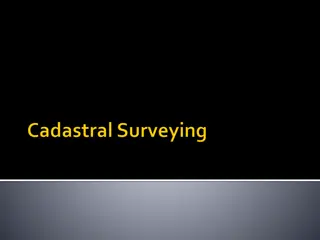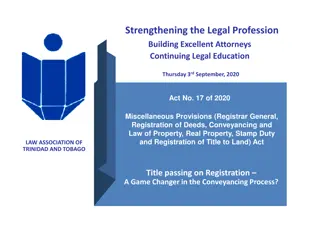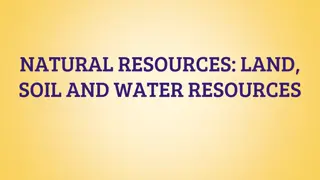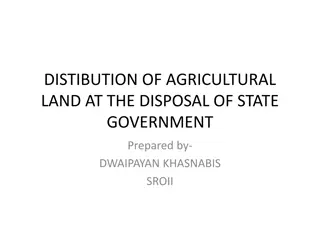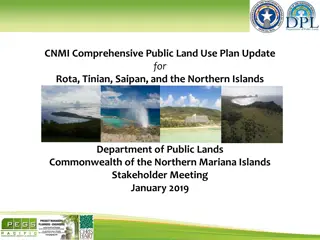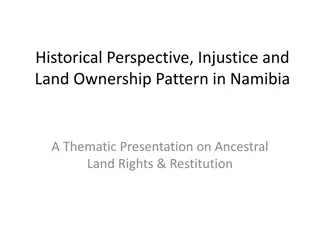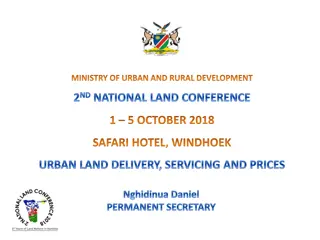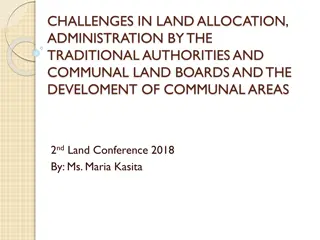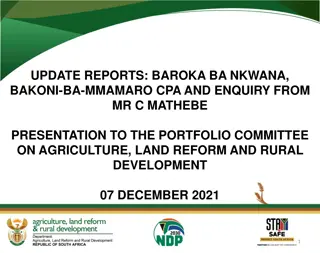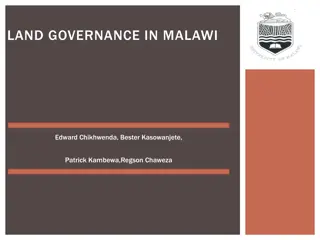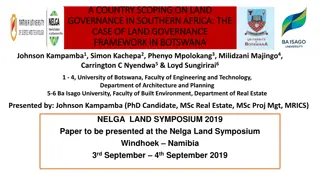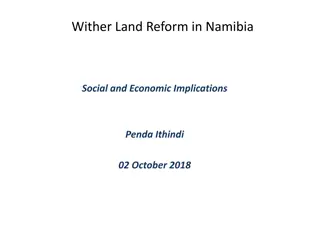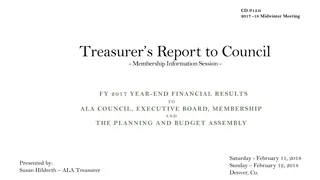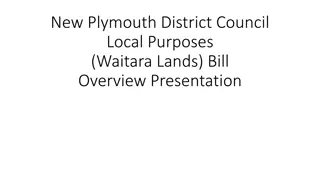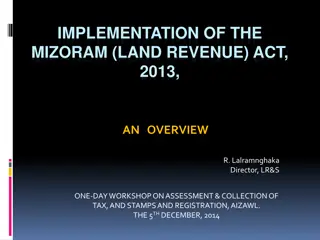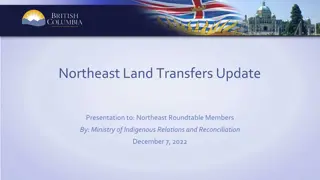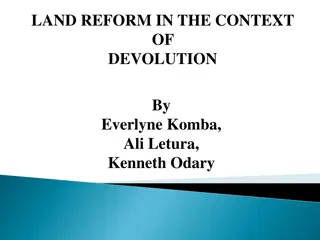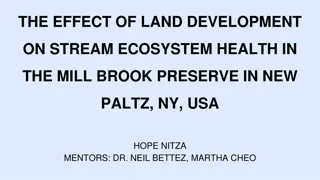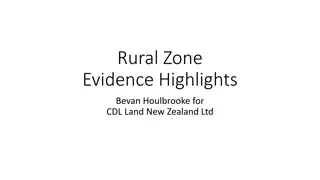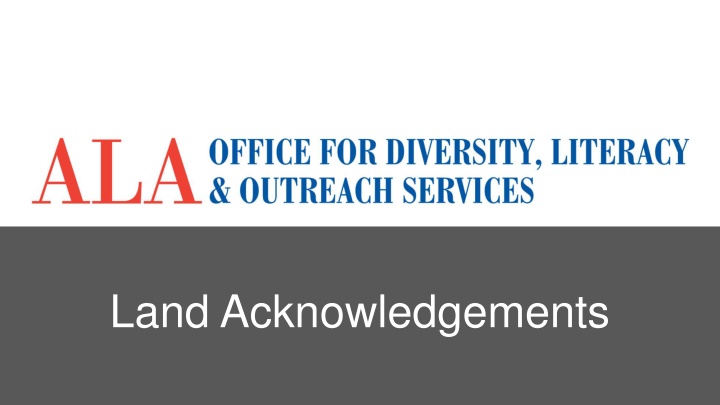
Land Acknowledgements and Indigenous Protocols
Explore the significance of land acknowledgements, Indigenous protocols, decolonization, and the history of colonialism in the U.S. Learn about the importance of acknowledging traditional Indigenous lands, respecting Indigenous communities, and working towards reconciliation.
Download Presentation

Please find below an Image/Link to download the presentation.
The content on the website is provided AS IS for your information and personal use only. It may not be sold, licensed, or shared on other websites without obtaining consent from the author. If you encounter any issues during the download, it is possible that the publisher has removed the file from their server.
You are allowed to download the files provided on this website for personal or commercial use, subject to the condition that they are used lawfully. All files are the property of their respective owners.
The content on the website is provided AS IS for your information and personal use only. It may not be sold, licensed, or shared on other websites without obtaining consent from the author.
E N D
Presentation Transcript
The American Library Association Headquarters, located in Chicago, IL, sits on traditional Ho-Chunk and Potawatomi land. Chicago is home to the 3rd largest Urban Indian populations in the country with over 100 tribal nations represented.
Acknowledging the land and the people is a common practice among Indigenous communities at the beginning of ceremonies and public events. Opening with respect and reverence.
Indigenous Protocols Reservations in South Dakota Great Sioux Nation Seven Bands Lakota Dakota Nakota Sicanjou Oglala Sans Arc Hunkpapa Miniconjou Blackfeet/Blackfoot Two Kettles Cheyenne River Crow Creek Flandreau Santee Lower Brule Pine Ridge Rosebud Sisseton Wahpeton Standing Rock Yankton Hunkpapa & Miniconjou Band of Lakota Cheyenne River Sioux Tribe Jody Gray Lakota Jody Gray (Lakota) Jody Gray (Cheyenne River Sioux Tribe) Jody Gray (Cheyenne River Lakota Tribe)
Basics to explore When you want to do a land acknowledgement
Decolonization Dismantling colonialism, which is that act of domination one or more territories by a nation or dominant group. Reconciliation Process that seeks to heal relations by uncovering pertinent facts, distinguishing truth from lies, and allowing for acknowledgement, public mourning, forgiveness, and healing.
Over 500 federally recognized tribes in the United States Over 400 tribes that are not recognized by the U.S Federal Government
Acknowledgement of the history and legacy of colonialism Call to recognize the role of an institution or organization in the trauma that is part of the structure of colonialism Step towards reconciling the often erased Indigenous people s history and modern existence Acknowledgement of the traditional Indigenous inhabitants of the land Awareness and appreciation of contemporary Indigenous communities What is a land Acknowledgement?
Small, but powerful gesture Reflect and call to act on how an institution or organization impacts Indigenous communities Creates broad awareness about colonialism and reconciliation Why do a land acknowledgement? Celebration of the historical and contemporary lives of Indigenous communities Recognition of sovereignty
Misinformation Power dynamics Whose voice is being used What to be conscious of when doing a land acknowledgement. It is not a ceremony Tokenism NEVER a statement ONLY Impact
Considerations for Developing a Land Acknowledgement American Library Association
Reflection Questions Why are you doing an acknowledgement? How does it relate to the work you are doing? What intentions do you have to disrupt and dismantle colonialism beyond this acknowledgement?
Each group may have their own responses to these reflection questions, but in the interest of being consistent and intentional about our messaging, we are providing some key elements within ALA that answer these questions.
Reflection Questions Why are you doing an acknowledgement?
Commit to ameliorating marginalization and underrepresentation within the association and the communities served by libraries through increased understanding of the effects of historical exclusion. Strategic Direction on EDI Goal 1 Strategic Direction on EDI Goal 7 Provide safe, respectful space for diverse voices and perspectives Ensure that the values of EDI are embedded in all continuing education, including ALA and ALA Division conferences, relating to all aspects of the profession and its practice Strategic Direction on EDI Strategy 8 Develop continuing education specifically focused on understanding and addressing unconscious bias, power dynamics, microaggressions, white privilege, and other topics related to EDI Strategic Direction on EDI Strategy 9 TF-EDI Honor local culture (Native and other) by inviting presenters to be part of the opening of conference. Recommendation 3.7
Reflection Questions How does it relate to the work you are doing?
American Indian Library Association Rural, Native, and Tribal Libraries of All Kinds Committee Indigenous library workers ALA Mission: to provide leadership for the development, promotion and improvement of library and information services and the profession of librarianship in order to enhance learning and ensure access to information for all. Communities served by libraries Tribal Libraries Power to bring awareness and education when we are in different regions of the country
Reflection Questions What intentions do you have to disrupt and dismantle colonialism beyond this acknowledgement?
???? Engagement Context Intentional Collaboration with AILA and local indigenous communities Education Website/Resources Awareness Statement
Best Practices for Developing a Land Acknowledgement American Library Association
Who are the traditional inhabitants of the area? Consider the fact that there are contested histories and a long legacy of resettlement that should be recognized. Multiple groups may have a history in the area. Recognize all groups. Identify
. Consult with ODLOS, AILA, or Local Indigenous Communities ODLOS has been identifying Indigenous scholars and has a slate of folks who we have worked with previously. We are always looking for more, so even if you don t utilize our resources, we would love it if you shared yours with us. The American Indian Library Association is an affiliate of ALA and has representation from all over the world. Regardless of how we initially engage with a community, at some point we bring in AILA as an advocate or sponsor and look to them for guidance. Consult local indigenous communities. Seek information from local universities with American Indian/Native/Indigenous Studies programs. Utilize Indigenous voices and compensate them for their time. Engage
Provide context for members ALA has created websites for each conference that lay out the following details: Tribal affiliations in the regions History of the tribes Current artists, businesses, museums, cultural centers, and events Context
Articulate Formulate a statement ALA website uses this statement on our Indigenous acknowledgement pages: The American Library Association would like to acknowledge the indigenous history of the state of ___________ and recognize the _______________. Provide a pronunciation of names
Identify when and where the acknowledgement should be delivered and by whom The ALA President delivers the acknowledgement at the General Opening Session Deliver
Annual Conference Midwinter Meetings Seminole and Miccosukee Tribes of Florida 2016 - Orlando,FL Seminole and Miccosukee Tribes of Florida Muscogee and Cherokee Tribes of Georgia 2017 Atlanta, GA Muscogee and Cherokee Tribes of Georgia Seminole and Miccosukee Tribes of Florida Muscogee and Cherokee Tribes of Georgia Seminole and Miccosukee Tribes of Florida Muscogee and Cherokee Tribes of Georgia Potawatomi Tribe of Illinois 2017- Chicago, IL Potawatomi Tribe of Illinois Indigenous Tribes of Colorado 2018 Denver, CO Indigenous Tribes of Colorado Potawatomi Tribe of Illinois Indigenous Tribes of Colorado 2018 New Orleans, LA Indigenous Tribes of Seattle and Washington 2019 Seattle, WA Indigenous Tribes of Seattle and Washington Indigenous Tribes of New Orleans Louisiana Indigenous Tribes of New Orleans & Louisiana Indigenous Tribes of New Orleans Louisiana Indigenous Tribes of Seattle and Washington Indigenous Tribes of New Orleans Louisiana Indigenous Tribes of Washington DC 2019 Washington, DC Indigenous Tribes of Washington DC With information about use of American Indian Mascots Indigenous Tribes of Washington DC
Sample Statements ALA & ACRL
2019 Association of College and Research Libraries Conference Land Acknowledgement Today we would like to acknowledge that the Ohio region is the homeland of 13 tribal nations that now exist West of the Mississippi River. The city of Cleveland sits on the ancestral homeland of the Delaware, Wyandotte (Wa d t (Wandat), Potawatomi, Ottawa, and Shawnee peoples. We strive to hold space and value the perspectives that the tribes share regarding their histories, cultures, traditions, and most importantly the power of their languages. To Recast the Narrative in academic and research libraries we invited indigenous people to help us understand the historical significance of the place where we are gathering. Together, let us learn more about the indigenous peoples and the places we visit. Let us explore how we might build relationships with sovereign tribal nations to lead higher education to be inclusive spaces fostering innovation and collaboration. We have provided additional information about the 13 tribal nations on ACRL s Conference website to further your knowledge of the Ohio Valley.
2019 ALA Midwinter Meeting, Seattle, WA Conference Land Acknowledgement On behalf of the American Library Association, we acknowledge the land and water on which we gather today as the traditional territories of the Coast Salish people, the traditional home of all the tribes and bands within the Duwamish [Due-WAH- mish], Suquamish [sue-QUAH-mish], Tulalip [two-LAY-lup] and Muckleshoot nations. Without them, we would not have access to this gathering and to this dialogue. I ask that we take this opportunity to thank the original caretakers of this land and water who are still here. And that we take time to learn about these Nations while we are here in Seattle and Washington state, the home of more than 30 tribal Nations. (you will find more information about these tribes on the 2019 ALA Annual Conference website.) http://www.ala.org/aboutala/indigenous-tribes-seattle-and-washington
2018 ALA Annual, New Orleans, LA Conference Land Acknowledgement The American Library Association would like to acknowledge the indigenous land and people of New Orleans, and more broadly, Louisiana. We recognize the Chitimacha [Chee-ta-match-ah] Tribe of Louisiana, the Coushatta [koo-shot-ah] Tribe of Louisiana, the Jena Band of Choctaw Indians, and the Tunica-Biloxi [Toon- ee-cha] Indian Tribe of Louisiana. You will find more information about these tribes on the 2018 ALA Annual Conference website.
The American Library Association would like to acknowledge the indigenous history of Seattle, and more broadly, Washington, and recognize the 29 federally recognized tribes throughout Washington state, as well as the Duwamish, Wanapum, and Chinook, who are not federally recognized. Visit the ALA website to learn more about the indigenous communities of the region.
Thank you Jody Gray jgray@ala.org

